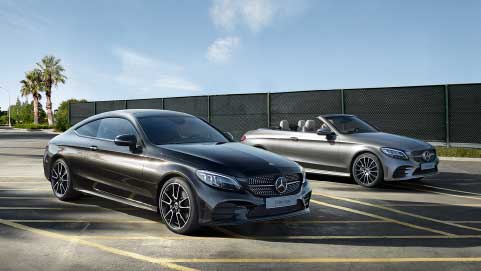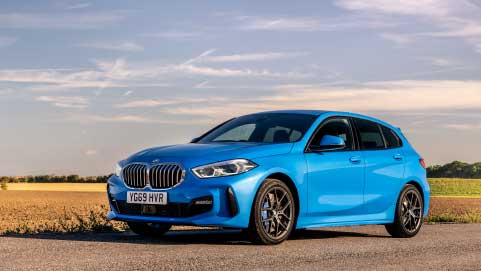Vehicle Excise Duty (VED) has long been a cost associated with owning a vehicle and is an expense that can add up for businesses that operate with a large fleet. Previously, vehicles were grouped into bands based on emissions, with the 'cheapest' band (Band A) offering a £0 tax charge. However, new measures announced by the Government will see change to the existing road tax system.
In this article, we explain how VED rates are set to change for 2025, allowing you to prepare for a potential increase in cost to your fleet.
- What are Vehicle Excise Duty (VED) rates?
- How did VED rates work previously?
- How will VED rates change for 2025?
- What is the Expensive Car Supplement?
- How much will I have to pay?
- Impact of VED Rate changes on fleet management
- Frequently asked questions
What are Vehicle Excise Duty (VED) rates?
Vehicle Excise Duty (VED), also referred to as 'road tax' or 'car tax', is a levy imposed on most vehicles driven in the United Kingdom. With changes to VED coming in 2025, it’s more important than ever for vehicle owners and fleet managers to understand how this tax is calculated. VED is primarily based on a vehicle's emissions; the cleaner your vehicle, the less tax you’ll need to pay.
For fleet managers, this means emissions data should play a key role in choosing vehicles. Hybrid and electric vehicles are often favored because they tend to have lower VED rates, reducing overall operational costs.
VED payments go directly into the UK government's central fund, supporting vital projects that benefit society as a whole. While some of these funds are allocated to road infrastructure and development, they also contribute to other public services, much like income tax or corporate tax.
How did VED rates work previously?
In the past, Vehicle Excise Duty classified vehicles into bands based on their emissions. The system was split into two key parts:
Initial car tax payment: For vehicles registered after the 1st April 2017, owners paid an initial tax in the first year, ranging from £0 to £2,365, depending on the vehicle's emissions.
Flat annual rate: After the first year, a flat rate applied, although the amount varied based on emissions and fuel type:
- £190 for petrol or diesel vehicles
- £180 for alternative fuel vehicles, including hybrids
- £0 for all-electric vehicles
For vehicles registered between the 1st March 2001 and 31st March 2017 annual fees were calculated based on emissions bands. Low-emission vehicles (Band A) were exempt from VED, while the highest emitting vehicles (Band M) faced an annual fee of up to £735.
How will VED rates change for 2025?
Generally speaking, the VED rate system will see no major changes in the way it operates. However, starting from the 1st April 2025, there will be new measures introduced to road tax that applies to both new and used vehicles:
- First-year VED for electric vehicles (EVs): New zero-emission vehicles will now be subject to the lowest first-year VED rate, which is currently £10. This first year rate will be in place until at least 2029/30. From the second year of ownership, they will go to the standard rate of £195 annually with the Government announcing this standard rate will increase in line with the Retail Price Index (RPI).
- Vehicles with low emissions (1-50g/km CO2): These vehicles will be subject to a substantial increase in first year tax. Previously this rate was £10. This will now increase to £110 in the first year.
- Expensive Car Supplement: The current exemption for electric vehicles from the Expensive Car Supplement will end. As a result, new zero-emission cars registered from 1st April 2025 with a list price of £40,000 or more will be subject to a £425 per year supplement for five years, which starts from the first VED payment that is made when the car is a year old. The Government has stated that it will "consider raising" the threshold for the current Expensive Car Supplement for electric cars, but "only at a future fiscal event."
- BIK Tax Increase for EVs: The Benefit-in-Kind (BIK) tax rate for EVs, which was fixed at 2 percent until 2025, will rise incrementally by 1 percent each year after April 2025. The Government will now also class double-cab pick-ups as cars too making them liable to other taxes including Benefit-in-Kind (BIK).
- Vehicles with emissions between 51 and 75g/km CO2: These vehicles (including hybrids) will see the first-year tax increase to £130.
- Higher emissions vehicles (76g/km+): These vehicles will see the first-year tax double from their current level.
While these measures are estimated to raise over £500 million annually, the financial impact on fleet operators could grow significantly. Factoring these costs into your long-term business plan is essential to maintain profitability and reduce unexpected tax expenses.
What is the Expensive Car Supplement?
The Expensive Car Supplement is an additional charge imposed under the Vehicle Excise Duty (VED) system, introduced in April 2017. Owners of cars with a list price of over £40,000 are required to pay an extra £425 on top of their standard VED rate. This additional fee comes into effect for five years from the date of the first VED car tax payment, which is made when the car is a year old. Initially, electric vehicles (EVs) were exempt from this supplement to encourage adoption.
As part of the broader changes to the road tax system in 2025, electric vehicles will no longer enjoy this exemption. Owners will now need to pay the supplement if their vehicle meets or exceeds the price threshold. This adjustment aims to create a fairer taxation system that aligns vehicle tax contributions with the usage and impact of higher-value vehicles on public infrastructure. As mentioned above, the Government has stated that it will 'consider raising' the threshold for the current Expensive Car Supplement for electric cars, but 'only at a future fiscal event'.
Fleet managers have long found EVs appealing due to the taxation and sustainability benefits associated with these vehicles. However, the new system can significantly impact budgets if not properly considered. Operators with large fleets of EVs which were previously exempt from the supplement should carefully evaluate their fleet composition and budget forecasts to maintain financial viability while supporting sustainable initiatives.
How much will I have to pay?
The amount of road tax you have to pay is reliant on a couple of factors including date of registration, fuel type and its emissions. Even if your vehicle is already registered, the amount of VED you're required to pay may change once the new rules have rolled out.
Vehicles registered after 1st April 2017
If you are considering some new vehicles for your fleet or have recently updated your existing fleet, then you can expect to pay the following:
|
CO2 Emissions
(g/km) |
First Year Rate | Standard Rate |
| Zero | £10 | £195 |
| 1 to 50 | £110 | £195 |
| 51 to 75 | £130 | £195 |
| 76 to 90 | £270 | £195 |
| 91 to 100 | £350 | £195 |
| 101 to 110 | £390 | £195 |
| 111 to 130 | £440 | £195 |
| 131 to 150 | £540 | £195 |
| 151 to 170 | £1,360 | £195 |
| 171 to 190 | £2,190 | £195 |
| 191 to 225 | £3,300 | £195 |
| 226 to 255 | £4,680 | £195 |
| Over 255 | £5,490 | £195 |
The first-year rate only applies to new vehicle registrations, so cars already on the road will start paying the standard rate from 1st April 2025.
In addition to the standard rate payment each year, vehicles with a list price of over £40,000 will be required to pay the expensive car supplement for their first 5 years on the road, as discussed above. This is currently £425 per year and now includes electric vehicles that were previously exempt.
Vehicles registered between March 2001 & April 2017
If your fleet is currently made up of older vehicles, then you can expect to pay the following each year:
| VED Banding |
CO2 Emissions
(g/km) |
Annual Vehicle Tax
(petrol/diesel cars) |
Annual Vehicle Tax
(alt. fuels) |
| A | Up to 100 | £10 | £10 |
| B | 101 to 110 | £20 | £10 |
| C | 111 to 120 | £25 | £25 |
| D | 121 to 130 | £150 | £150 |
| E | 131 to 140 | £180 | £180 |
| F | 141 to 150 | £200 | £200 |
| G | 151 to 165 | £245 | £245 |
| H | 166 to 175 | £295 | £295 |
| I | 176 to 185 | £325 | £325 |
| J | 186 to 200 | £375 | £375 |
| K* | 201 to 225 | £405 | £405 |
| L | 226 to 255 | £700 | £700 |
| M | Over 255 | £725 | £725 |
*This includes cars emitting over 225g/km registered before 23rd March 2006.
Impact of VED Rate changes on fleet management
The changes to road tax in 2025 isn't expected to have a profound impact of the management of fleets, if the additional costs are accurately considered. The actual process for paying for your VED will largely remain unchanged, but the amount you have to pay will increase depending on your exact fleet solutions.
Fleet managers who have shifted towards EVs for tax and sustainability benefits may face new financial pressures, making it important to reassess total cost of ownership (TCO) models. This is especially relevant as many fleets with EVs that were exempt from this charge will now need to adjust their financial projections.
We recommend that fleet operators consider their vehicle replacement cycles and order/register new vehicles ahead of the new changes. This way, there's potential to save up to £600 per vehicle for the first year of ownership.
Despite these additional costs, EVs are still some of the most cost-effective fleet vehicles available and will continue to be a popular option for many businesses across the UK.
Frequently Asked Questions
When registering a new vehicle, you'll need to pay the initial tax payment, followed by an annual VED payment from the second year onwards. These costs are typically paid annually as a single payment and can often be integrated into your leasing agreements; you may also be able to deduct up to 100 percent of the cost from your business' taxable profits.
Due to the rising number of electric vehicles on the road, this change has been introduced to ensure that all road users contribute fairly to road taxation. With more EVs being registered each year, this adjustment helps to offset the reduction in tax revenue from petrol and diesel vehicles, as the government works toward its goal of phasing out new petrol and diesel cars by 2030. Despite this additional cost, electric vehicles remain appealing for fleet managers due to their lower running costs, long-term savings, and contribution to sustainability goals, helping to reduce a fleet’s overall carbon footprint.
In previous years, each road user was issued with a tax disc that was typically displayed in the front windscreen of the vehicle, proving its tax compliance. Nowadays, the tax disc has been abolished and road tax is monitored by the DVLA and Police through an extensive network of automatic number plate recognition (ANPR) cameras. These cameras capture vehicle number plates and instantly cross-reference them with the DVLA database to check if a vehicle is taxed, insured, and has a valid MOT.
Those caught driving without road tax could face fines of up to £1,000, run the risk of having their vehicle clamped or seized, and may be summoned to court until the correct amount of tax is paid.
The 2025 road tax changes are not expected to impact the administrative process for paying Vehicle Excise Duty (VED). Fleet managers will still use the existing online systems for managing vehicle tax payments. However, it’s essential to re-familiarise yourself with the new VED rates, especially for electric vehicles, which will now be subject to the Expensive Car Supplement. Incorporating these new costs into your wider fleet management strategy will help to ensure smooth operations.
No, the Government have confirmed that other incentives for electric vehicles will continue to encourage individuals and businesses to make the switch.
You're able to identify which tax band your vehicle resides in by reviewing the CO2 emissions details in the V5C registration certificate. Alternatively, you can find your vehicle's emissions details on the Government website.
What can I do to minimise the impact on my fleet?
The best way to minimise the impact of the 2025 road tax changes is to familiarise yourself with any additional costs your fleet may face and integrate these into your strategic planning. By doing so, you’ll better manage your cash flow and keep your fleet empowering your business rather than burdening it.
We also recommend for you to start asking about lead times now, as delaying orders could be expensive. With many vehicles being ordered and kept on typical three or four-year lease cycles, the cost implications of these tax changes will result in a significant increase in the overall cost of taxing EVs over the next few years.
A key consideration for fleet operators would be to consider adjusting planned vehicle changeovers and place orders before the road tax changes come into effect, where possible. You could see an approximate saving of up to £600 per vehicle (in their first year) compared to orders delivered after April 2025.
At Pendragon Vehicle Management, our expert account managers are on-hand to support and advise on the road tax updates and recommend the best fleet management solutions for your business. Get in touch to begin your journey today.











